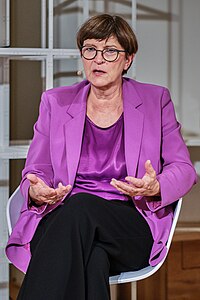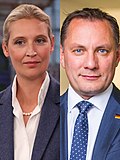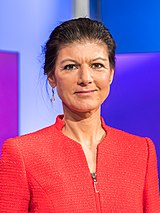Draft:Next German federal election
| |||||||||||||||||||||||||||||||||||||||||||||||||||||||||||
All 630 seats in the Bundestag 316 seats needed for a majority | |||||||||||||||||||||||||||||||||||||||||||||||||||||||||||
|---|---|---|---|---|---|---|---|---|---|---|---|---|---|---|---|---|---|---|---|---|---|---|---|---|---|---|---|---|---|---|---|---|---|---|---|---|---|---|---|---|---|---|---|---|---|---|---|---|---|---|---|---|---|---|---|---|---|---|---|
| Opinion polls | |||||||||||||||||||||||||||||||||||||||||||||||||||||||||||
| |||||||||||||||||||||||||||||||||||||||||||||||||||||||||||
 A map of Bundestag constituencies used at the 2025 election. | |||||||||||||||||||||||||||||||||||||||||||||||||||||||||||
| |||||||||||||||||||||||||||||||||||||||||||||||||||||||||||
The next German federal election will be held on or before 25 March 2029 to elect the members of the 22nd Bundestag.
Background
[edit]Date assignment
[edit]The Basic Law and the Federal Election Act provide that federal elections must be held on a Sunday or on a national holiday[b] no earlier than 46 and no later than 48 months after the first sitting of a Bundestag, unless the Bundestag is dissolved earlier. The 21th Bundestag will hold its first sitting on 25 March 2025 or earlier. Therefore, the next regular election has to take place on a Sunday between 26 January 2029 and 25 March 2029. The exact date will be determined by the president of Germany in due course.[1] Federal elections can be held earlier if the President dissolves the Bundestag and schedules a snap election. They may only do so under two possible scenarios described by the Basic Law.
- After a federal election or any other vacancy in the chancellor's office, if the Bundestag fails to elect a chancellor with an absolute majority of its members by the 15th day after the first ballot, the president is free to either appoint the candidate who received a plurality of votes as chancellor or to dissolve the Bundestag (in accordance with Article 63, Section 4 of the Basic Law).
- If the chancellor proposes a motion of confidence which fails, they may ask the president to dissolve the Bundestag. The president is free to grant or to deny the chancellor's request (in accordance with Article 68 of the Basic Law).
In both cases, federal elections would have to take place on a Sunday or national holiday no later than 60 days after the dissolution.[2][3][c] Under both scenarios, a snap election is not possible during a state of defence. Federal elections can also be held later, if a state of defence is declared. If a state of defence prohibits a scheduled federal election and prolongs a legislative period, new elections have to take place no later than six months after the end of the state of defence.
Electoral system
[edit]Germany has a mixed-member proportional electoral system. Voters have two votes: the first vote is used to directly elect a candidate in their own constituency using first-past-the-post, and the second vote is for a party's electoral list. To enter the Bundestag, a party must either get five percent of the nationwide second vote or get the plurality of the vote in three constituencies. Both cases result in that party entering the Bundestag, and it receives seats in proportion to its national share of the second vote. The Bundestag is fixed at 630 members, with the second vote alone determining the partisan composition of the Bundestag. If a political party wins overhang seats in a state, its constituency winners are excluded from the Bundestag in decreasing order of their first vote share.[4] Independent candidates may still be elected if they receive a plurality of the vote in their constituency.[5] Political parties representing national minorities are excempt from the 5% threshold. This has allowed the SSW (a party representing Danes and Frisians) to be represented in the Bundestag since 2021, despite receiving less than 5% of the national vote share.
Political parties and leaders
[edit]The table below lists the parties represented in the 21st Bundestag.
Opinion polls
[edit]| Polling firm | Fieldwork date | Sample size |
Abs. | SPD | Union | Grüne | FDP | AfD | Linke | BSW | Others | Lead |
|---|---|---|---|---|---|---|---|---|---|---|---|---|
| 2025 federal election | 26 Sep 2021 | – | xx.x | xx.x | xx.x | xx.x | xx.x | xx.x | xx.x | xx.x | xx.x | x.x |
Notes
[edit]- ^ Merz is the leader of the CDU/CSU group and the CDU; Markus Söder is the leader of the CSU
- ^ In Germany, with the exception of the German Unity Day, all holidays are determined on the state level, and because of that, they do not necessarily apply for all German states. Currently, legal holidays in all states are New Year's Day, Good Friday, Easter Monday, Labour Day, Ascension Day, Whit Monday, German Unity Day, First Christmas Day, and Second Christmas Day (Boxing Day).
- ^ Possibility 1 has not happened since 1949; possibility 2 has been used a total of four times (in 1972, 1982, 2005, and 2025).
References
[edit]- ^ "§ 16 BWahlG – Einzelnorm". gesetze-im-internet.de. Archived from the original on 17 November 2020. Retrieved 24 April 2019.
- ^ "Wahl zum 19. Deutschen Bundestag am 24. September 2017". Der Bundeswahlleiter. Archived from the original on 8 November 2020. Retrieved 26 September 2017.
- ^ Martin Fehndrich (26 February 2017). "Bundeskanzlerwahl". Wahlrecht.de. Archived from the original on 8 May 2022. Retrieved 26 September 2017.
- ^ Frank Bräutigam; Kolja Schwartz. "Bundesverfassungsgericht kippt das neue Wahlrecht in Teilen" [Federal Constitutional Court overturns the new electoral law in parts]. tagesschau.de (in German). Archived from the original on 30 July 2024. Retrieved 30 July 2024.
- ^ "Bundeswahlgesetz" (PDF). Die Bundeswahlleiterin (The Federal Returning Officer).










